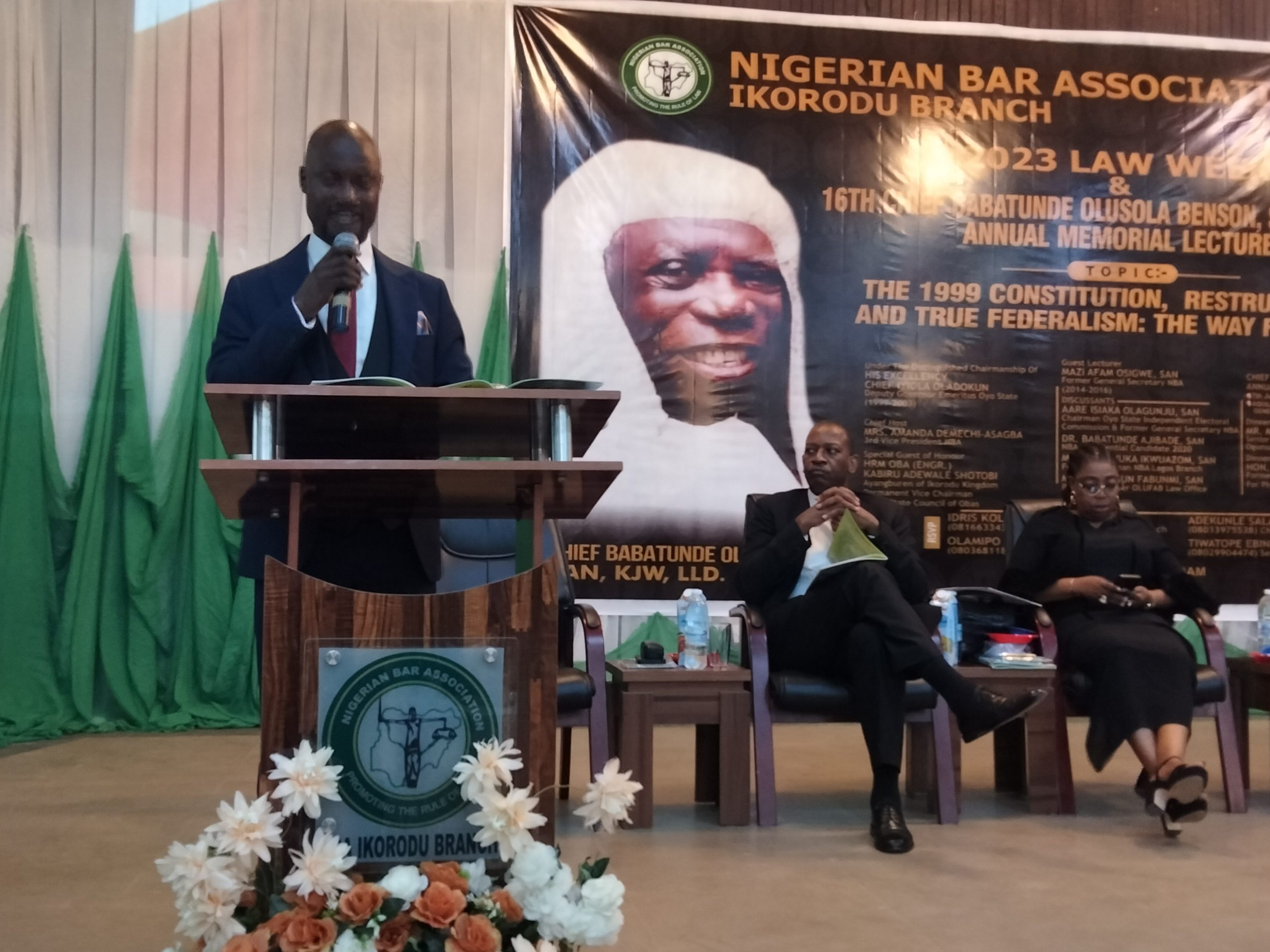– Calls for Devolution of More Powers To States, LGovt.
Some Senior Advocates of Nigeria, SANs, have advocated for a federalism that devolved more powers to the states and local government areas, LGA, than the central government.
The SANs spoke at the Annual Memorial Lecture of Chief Babatunde Olusola Benson, SAN, on the topic: “The 1999 Constitution, Restructuring and True Federalism: The Way Forward”.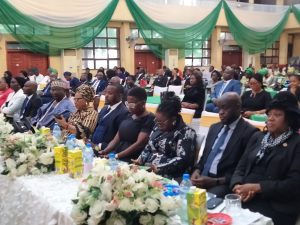
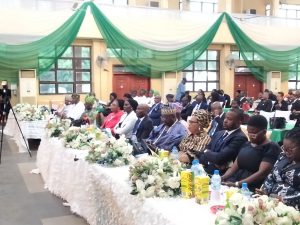
The event, themed: “2023 And Beyond: The Imperatives of True Federalism In Nigeria’s Constitutional Democracy”, was part of activities to mark the 2023 Law Week of the Nigerian Bar Association, NBA, Ikorodu Branch.
The senior legal practitioners include; the Guest Speaker of the event & former General Secretary of NBA, Mazi Osigwe, SAN; Chairman of the event & former Deputy Governor of Oyo State, His Excellency Chief Iyiola Oladokun; Chairman Oyo State Independent Electoral Commission & former General Secretary of NBA, Aare Isiaka Olagunju, SAN; Dr Babatunde Ajibade, SAN; former Chairman, NBA Lagos Branch, Chukwuka Ikwuazom, SAN; and Principal Partner Olufab Law Office, Olusegun Fabunmi, SAN.
Osigwe, in his paper, noted that States should be allowed to have more authority over their affairs and the Federal Government should recognize the importance of devolving more powers to the States.
According to him, “all parts of Nigeria must be made to understand that to prevent strives, civil disturbances, secession and preserve the union, restructuring is the most peaceful and least destabilizing way to keep the peace and build an enduring nation.
“The hope of the common man will continue to wane if we do not fix the country so that the people will enjoy the dividends of democracy.. If we get our federal system properly fixed, everything will fall in place”, he said.
Osigwe said the way forward is to agree on what needs to be taken out of the constitution and replace them with what is agreed will enhance the workability of our federation.
He added that there are 30 items on the concurrent list in which the federal and state governments can both act on.
“The 30 items in the concurrent list should be reviewed to transfer some items to the residual list. Items like industrial, commercial and agricultural development, health and education should exclusively be reserved for the federating units (states). Removing many items in the exclusive legislative list of 68 items, in respect of which only the Federal Government has legislative competence and transfer the items to the states.”
Osigwe said “resource control should be decentralized to make Nigeria more productive, economically buoyant and less dependent on oil. States should be allowed to control the exploration of resources found within their territory and pay tax to the central/ federal government. The tax powers of each tier of government should be reversed, in favour of states and local governments.”
He said the demand by some states to establish their own state police service, not force, should be considered, adding that this may entail removing the Nigeria Police “Force” and policing from the exclusive list and putting it in the concurrent.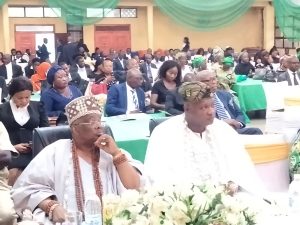
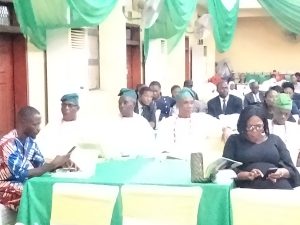
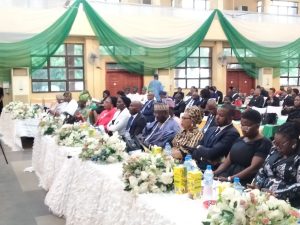
On his part, Olagunju, who was one of the discussants, said restructuring and true federalism are critical to the development and stability of Nigeria’s constitutional democracy.
He noted that to achieve true federalism, the constitution needs to be amended, the revenue allocation formula needs to be reviewed, and the political structure of the country needs to be restructured.
He believed that a more decentralized system of government that devolves powers and resources to the states and regions could help to address the challenges facing the country, and promote greater participation and representation in federalism.
Agreeing with Osigwe, Olagunju added that to achieve true federalism and restructuring in Nigeria, there was need to amend the 1999 Constitution to devolve more powers and resources to the states and regions.
He also agreed with the guest speaker that the exclusive legislative list, which currently gives the federal government control over a wide range of areas, including education, health, and transportation should be revisited to reverse the present trend.
He argued that a more equitable system of revenue allocation, which takes into account the resources and needs of each state, would help to reduce tensions and promote greater cooperation between the different regions and ethnic groups in Nigeria.
He insisted that a restructured true federalism that is built on structures accepted from all states and people in various political zones is the solution to the challenges the country is facing now.
Also, discussing the topic, Dr. Ajibade, leaning on problems being faced by the country as enumerated by Osigwe, said the best thing will be to turn the whole thing down and start all over again because Nigerians were never invited to participate when the constitution was drawn.
“Since 1999, we have had successive governments that have been put in place based on the legitimacy of that 1999 constitution. To a large extent, it is unrealistic to hope or to expect that they would dismantle the very instrument that gives them legitimacy.
“We are on the 5th amendments now. The good news is that we have exhibited the capacity to thinker with the constitution. While the ideal thing is for us to have a national constitutional conference, where all the constituent parts of the country would come together and renegotiate the way they want to relate with each other, I think what we need to do is to focus significant attention on the constitution amendment process.
‘The 1st to 4th alteration to the constitution have to my mind been relatively self serving in what they focused on. I think the challenge for us as a people, going forward, is that in this new dispensation, we need to engage with the new NASS as soon as it is constituted next week on the 13th, to ensure that our aspirations for our country are put forward and that our representatives take these aspirations seriously.”, he said
In his remarks, Ikwuazom said no two federal states practice federalism in the same way. He said the Supreme Court of Nigeria recognize this fact in the case of Olagunsoye Vs Federal Republic of Nigeria.
He said under federalism, there is a basic minimum structure that must exist before a state can be regarded as practicing federalism. He said amongst the minimum structure is that we must have a political system in which there is power sharing under a written constitution that shares power between a minimum of two levels of government. If that is lacking, we cannot call that political system a federation.
He agreed with Osigwe that from 1954, the constitutions that Nigeria had until 1963 entrenched federalism as a system of government. Under this constitution, each region enjoys true autonomy and developed at their own pace.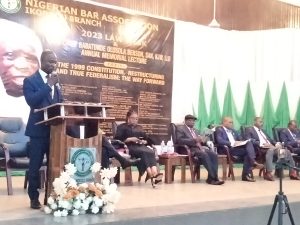
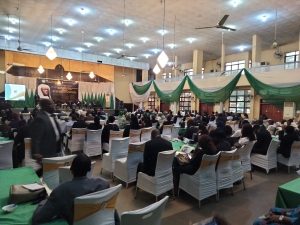
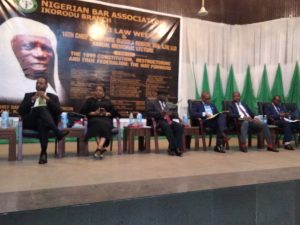
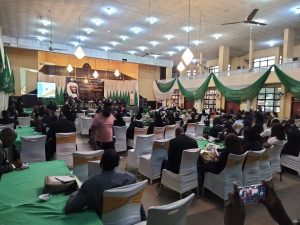
He noted that it was with intervention of the military that all of these started to change.
He said if the national assembly is composed of people who want the status continue, one can which what they want, nothing will happen as the process of amending the constitution will become more complex.
Earlier, Chairman, NBA Ikorodu, Kolawole Thany, in his opening remarks said unless lawyers take up the gauntlet to show direction, politicians would continue to fiddle with the principles of democracy, constitutionalism and rule of law, lives of the citizens and resource of the nation.
He urged President Bola Ahmed Tinubu to change the narrative and steer the ship of the state in a positive direction.

